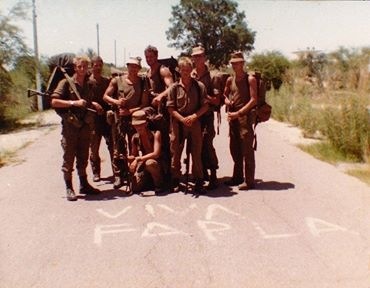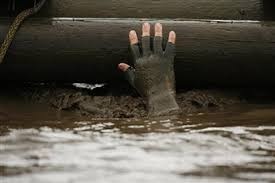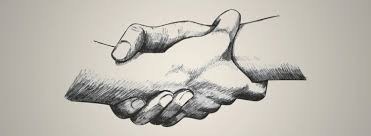The Infantryman

If you were in the SAI (South African Infantry) this was you.
We were Infantrymen, but what were we really?
For decades I’ve considered the impact the platoon had on us. Just when I think I’ve found some answers, another year goes by, and I change my thoughts again.
One thing I know for certain. That our dispersion at war's end disabled us given our severance from something far greater to which we belonged.
We were much more than just a platoon of 18 year olds bonded in the adversity of war.
We carried more power than the twenty-five R4 rifles with their six magazines tucked into our webbing.
We were more potent than our platoon stock of 4000 rounds, and more deadly than the 2000 rounds carried in belts for our three MAG machine guns.
We were more threatening than our assorted personal weapons, our rifles or 9mm Star pistols or shotguns or pangas or sheathed jack-knives.
We instilled more fear than the bombs lugged in rucksacks for launch by the 60mm mortar pipe during times of defence or attack.
We were more fearsome than the captured RPG-7 rocket launcher we shouldered, more ominous than the HE rockets protruding above soldiers' heads from the overloaded backpacks they hauled.
We were more forbidding than the Snotneusie, the M25 Grenade launcher, which most of us had a turn at carrying sooner or later.
More severe than the rifle grenades and mortar bombs and illumination mortars and coloured smoke grenades and ammunition belts and rocket flares and ballistic rounds spread out for transport amongst us.
Greater than the signalling power of the heavy B25 radio carried by our overburdened signaller, greater than the four B52 radios carried by our internal commanders.
Heavier than all this kit and the numerous sleeping-bags, bivvies, groundsheets, water-bottles, tins, ration packs, rifle-cleaning kits, empty sand-bags, fire-buckets and spades which counterinsurgency dictated we should carry.
We slogged through the bush with much more than all this and other necessities - old magazines, dog-eared novels, Sony Walkmans and tapes, bottles of suntan-lotion, toothbrushes and toothpaste, razors and shaving foam, toilet paper, slip-slops, packets of cigarettes, boxes of matches, dog-eared letters, Southern Cross writing materials, secret diaries, hidden cameras, treasured photographs, personal trinkets and good-luck charms.
We were more than the 40 kilogram haversacks to which we melded ourselves, and struggled with through thick sand and rough bush in heat that was frequently around 40 degrees Celsius.
We were more than the twenty-five weary figures laden with packs and webbing and weaponry staggering in leaden boots up to a muddy waterhole in the midday heat.
More than the crashing figures struck with adrenalin ploughing into the sand for cover when walking into contact with the enemy.
More than the sections taking directions by radio from a frantic young lieutenant as chaotic battle plans unfolded in yet another fleeting engagement under the relentless Owamboland sun.
The platoon was more about boys, decent boys mostly, reared in average, middle-class families across South Africa.
It was about boys from backgrounds of strong morality; church-goers many, boys who came together as national servicemen as a matter of course because politicians said they must.
It was about boys who did so because their older brothers and friends did so, and their cousins and uncles before them.
It was about boys who went off to the war more for adventure than idealism, more for a rite of passage than a war against Communism.
It was about a group of Afrikaans and English boys cast together into a warring tribe - the platoon - who developed a shared mind in one of Africa's less remembered wars.
A mind that evolved its own mutations - not all of them good, because war is a dark business - a shared mind that forged its own secrets in the bush.
Mutations and secrets we created then left behind us in the scorching sands of Owamboland and Angola.
Secrets that remain in the wrinkles of our comrades, and in our eyes when we look in the mirror.
Look into the mirror, brother - what do you see? You see your eyes softened by the passing of time and the playfulness of your children. You also see the eyes of a killer.
Yours were the eyes of our shared mind that fleshed into action the deeds we don't talk about.
That’s why we can’t speak about the war to outsiders.
Only our comrades understand - those greying men who were once part of our common mind. They know what we did and why we did it and they don’t judge. They remain loyal to the grave where they take our secrets.
When we left the war, our severance from the shared mind disabled us - but also released us. We became individuals again and built our lives alone and moved on.
Before that we were not our selves, yet were ourselves collectively.
Yes we were Infantrymen, but what were we really?
We were a tribe, a shared mind of boys whose job was to kill. That was the world to which we belonged.
A part of me has never been comfortable with that - and a bigger part misses it more.
"
Articles from Ian Weinberg
View blog
Under a November Full Moon · It happened upon us, a design bereft of our choice. · Thence have we tr ...

The concept of self-actualization is used pretty loosely. Coined originally by Kurt Goldstein, the c ...

I recall from my old biology days that the one differentiating factor between plants and animals is ...


Comments
Ian Weinberg
8 years ago#2
Pascal Derrien
8 years ago#1